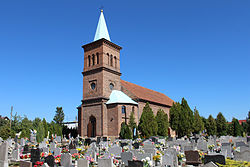Tułowice, Opole Voivodeship
Tułowice | |
|---|---|
Town | |
 Church of Saint Roch in Tułowice | |
| Coordinates: 50°35′36″N 17°39′18″E / 50.59333°N 17.65500°E | |
| Country | |
| Voivodeship | Opole |
| County | Opole |
| Gmina | Tułowice |
| Town rights | 2018 |
| Area | |
• Total | 9.23 km2 (3.56 sq mi) |
| Population (2019-06-30[1]) | |
• Total | 4,011 |
| • Density | 430/km2 (1,100/sq mi) |
| Time zone | UTC+1 (CET) |
| • Summer (DST) | UTC+2 (CEST) |
| Vehicle registration | OPO |
| Voivodeship roads | |
| Website | http://www.tulowice.pl/ |
Tułowice [tuwɔˈvit͡sɛ] (German: Tillowitz) is a town in Opole County, Opole Voivodeship, in southern Poland. It is the seat of Gmina Tułowice. It lies approximately 22 km (14 mi) south-west of the regional capital Opole. It is located within the historic region of Upper Silesia.
The town has a population of 4,011.
History
[edit]In the Middle Ages the settlement was under Polish rule, and then it was also part of Bohemia (Czechia), Prussia and Germany. In the 19th century it was also known in Polish as Tyłowice.[2] During World War II, the Germans established and operated the E581 forced labour subcamp of the Stalag VIII-B/344 prisoner-of-war camp in the village.[3] In August 1944, the Stalag 367 prisoner-of-war camp was relocated from Częstochowa to Tułowice, however, it was disbanded shortly afterwards.[4] The village was restored to Poland after the defeat of Nazi Germany in World War II in 1945. For most of its history, Tułowice was a village, before it was granted town rights in 2017, with effect from 2018.[5]
Transport
[edit]There is a train station, located on the Polish Railway Line No. 287 which connects Opole and Nysa.
Notable people
[edit]- Oskar Kellner, German agricultural scientist
Twin towns – sister cities
[edit]See twin towns of Gmina Tułowice.
Gallery
[edit]-
Church of the Resurrection of Christ
-
Monument commemorating the Constitution of 3 May 1791
-
Monument of Pope John Paul II
References
[edit]- ^ "Population. Size and structure and vital statistics in Poland by territorial division in 2019. As of 30th June". stat.gov.pl. Statistics Poland. 2019-10-15. Retrieved 2020-02-14.
- ^ Lompa, Józef (1847). Krótki rys jeografii Śląska dla nauki początkowej (in Polish). Głogówek. p. 28.
- ^ "Working Parties". Lamsdorf.com. Archived from the original on 29 October 2020. Retrieved 2 April 2021.
- ^ Megargee, Geoffrey P.; Overmans, Rüdiger; Vogt, Wolfgang (2022). The United States Holocaust Memorial Museum Encyclopedia of Camps and Ghettos 1933–1945. Volume IV. Indiana University Press, United States Holocaust Memorial Museum. p. 372. ISBN 978-0-253-06089-1.
- ^ Rozporządzenie Rady Ministrów z dnia 24 lipca 2017 r. w sprawie ustalenia granic niektórych gmin i miast, nadania niektórym miejscowościom statusu miasta, zmiany nazwy gminy oraz siedzib władz niektórych gmin, Dz. U., 2017, No. 1427







